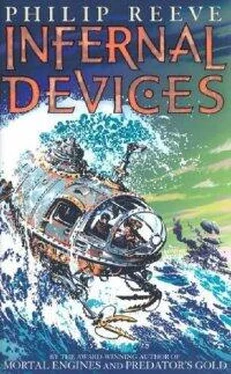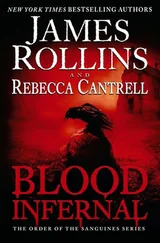“There was a time when just about anyone was allowed to go up and wander in the Pavilion gardens,” said Shkin. “That’s all changed since the war started. There’s no fighting in our part of the world, of course—the African Anti-Tractionists have no stomach for the Green Storm’s crusade—but Pennyroyal is still terrified that saboteurs or terrorists might take a potshot at him.”
That was the first Wren had heard about the war between the cities and the Storm. It explained why there were all those big, ugly gun batteries on the city’s esplanades, and why security was so tight.
“Purpose of your visit to Cloud 9, Mr. Shkin?” asked the commander.
“I have an interesting piece of merchandise to show to the mayor.”
“I’m not sure His Worship is buying slaves at the moment, sir.”
“Oh, he will not want to miss the chance of adding this one to his staff. I suggest you let us up without further delay, unless you wish to spend the rest of your career down on Tier Three, picking pubes out of the Sea Pool filters…”
There were no more objections. Shkin and his party were ushered quickly aboard, the cable car shuddered, and Wren, looking from its big windows, saw Brighton fall away below her. “Oh, look!” she murmured, entranced, but Shkin and his men had seen it all before.
Suddenly the howl of supercharged engine pods filled the cable car and swift shadows came flickering across its windows. Beyond the web of Cloud 9’s hawsers, a flock of fierce, spiky shapes cut through the afternoon sky. Wren shrieked, imagining that there had been an explosion up on Cloud 9 and that this was the debris raining down, but the shapes veered in formation and hurtled away across Brighton’s rooftops, their shadows speeding across the busy streets.
“But they’ve got no envelopes!” Wren cried. “No gasbags! How do they stay up? Heavier-than-air flight is impossible!”
Some of Shkin’s men laughed. The slave trader himself looked faintly pleased, as if her innocence added credence to her story. “Not impossible,” he said. “The secret of heavier-than-air flight was rediscovered a few years ago by cities eager to defend themselves against the Storm’s air fleets. There is nothing like fourteen years of war to encourage technological advances…” He raised his voice as the flying machines came swooping back, filling the sky with the bellow of engines. “This lot are called the Flying Ferrets. A mercenary air force, hired by our esteemed mayor to protect his palace…”
Wren turned to the window again as the machines sped by. They were fragile-looking contraptions, all string and balsa wood and varnished paper, their cockpits stripped down to a bucket seat and a nest of control sticks. Some had two batlike wings, others three or four or ten; some flapped along beneath black, creaking things like broken umbrellas. On their massive engine pods were painted hawks and sharks and naked ladies and raffish, devil-may-care names: Damn You, Gravity! and Bad Hair Day; Contents Under Pressure and Delayed Gratification NOW . A begoggled aviatrix waved at Wren from the cockpit of something called the Combat Wombat. Wren waved back, but the squadron was already pulling away, dwindling to a cluster of specks far off above the sea.
Wren was trembling as the cable car carried her up through the belly of Cloud 9 to its terminus in the Pavilion gardens. She had always believed that Dad and Miss Freya knew everything there was to know about the world outside Anchorage-in-Vineland, but clearly it had changed a lot in the sixteen years since they had crossed the ice. They had known nothing about this terrible war, which was almost as old as she was, and she doubted they could even imagine the bizarre flying machines she had just seen. It made her feel even farther away from them.
The pang of homesickness faded as her minders led her out of the upper cable-car terminus and along graveled paths toward the hub of Cloud 9, where the sugar-pink minarets and meringue domes of Pennyroyal’s palace rose from gardens filled with palm trees and cypresses, follies and fountains. Flocks of gaudy parakeets wheeled overhead, and above them Cloud 9’s transparent gasbags shone in the sunlight like enormous bubbles.
“Your business?” asked a house slave, stepping out to bar Shkin’s way.
“Nabisco Shkin,” the slave dealer replied, and that was enough; the man bowed and stammered something and waved the visitors on, up an elegant white staircase to a broad sundeck. At the heart of the sundeck was a pool. In the middle of the pool, adrift on his air bed in a gold lame swimming costume, a cocktail in one hand, a book in the other, his round face tilted to the sun, lounged Nimrod Pennyroyal.
Wren had worked out that Pennyroyal must be at least sixty-five, so she was expecting someone quite frail. But Pennyroyal had aged well. He had lost some weight and most of his hair, but otherwise he looked not much different from the photographs Wren had seen of him, taken during his brief, unhappy stint as Anchorage’s Honorary Chief Navigator. A bevy of attractive slave girls trod water around his floating bed, clutching fresh drinks, a bookmark, trays of cakes and sweets, and other items such as a busy mayor might need. A boy of Wren’s age, long and black as an evening shadow, stood on the poolside, waving an ostrich-feather fan.
“I see that Green Storm prisoner I sold you has settled in well,” said Shkin.
’Ah? Oh!” Pennyroyal opened his eyes and sat up. “Ah! Afternoon, Shkin.” He twisted round on his air bed to peer at the youth. “Yes, Mrs. Pennyroyal is delighted with him. Makes a very handy fan bearer. Lovely wafting action. And he goes so well with the dining room wallpaper.” He looked at Shkin again, and Wren had the impression that he wasn’t particularly pleased to see the slave trader. “Anyway, Nabisco, old chap, to what do I owe the um, ah…”
Shkin bowed faintly. “This girl was taken from one of the limpets we fished up last week. I thought you might wish to purchase her for the Pavilion.” He gestured toward Wren, and his assistants moved her closer to the poolside so that the mayor might have a better view of her.
Pennyroyal peered at her. “Lost Girl, eh? She scrubs up well, I must say. But I thought we agreed we don’t want any of her crowd hanging about in Brighton. Weren’t you planning to sell them all to Nuevo-Maya?”
“Afraid one of them might know a few awkward facts about your past, Pennyroyal?” said Shkin.
“Eh? What are you suggesting?”
“This girl,” Shkin announced, “has lately arrived from the Dead Continent. From a city long thought lost, but actually thriving in that blasted land. A city of which I believe Your Worship has fond memories.”
Reaching behind him, Shkin took something from one of his lackeys and lobbed it across the pool so that it landed on Pennyroyal’s air bed. The Tin Book. Pennyroyal picked it up and studied the cover with a puzzled frown, then turned it over and looked at the paper label on the back.
“Great Gods]” he gasped, spilling his drink into the pool. “Anchorage!”
“This girl,” Shkin said, “is none other than the daughter of your old traveling companion Hester Shaw.”
“Oh, cripes!” yelped Pennyroyal, and with a sudden, spasmodic lurch capsized his air bed.
“I was concerned to discover that there are certain discrepancies between the story she tells and the version of events in Your Worship’s interpolitan bestseller Predator’s Gold” explained Nabisco Shkin, looking not the least bit concerned as he stood there on the poolside, leaning on his black steel cane, watching Pennyroyal splash and flounder. “So I decided it might be best if I gave Your Worship the opportunity to purchase her before her account can become publicly known and… confuse Your Worship’s many readers. Naturally she is priced at a premium. Shall we say a thousand gold pieces?”
Читать дальше












